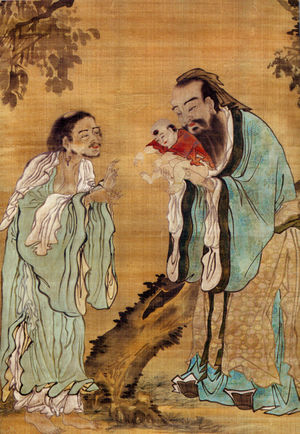Lao Tzu/is: Difference between revisions
No edit summary |
(Created page with "Lao Tzu (6. öld <small>f</small>.<small>Kr</small>.) var kínverskur spekingur og dulhyggjumaður, jafnan viðurkenndur sem stofnandi taóismans og höfundur ''Tao-te Ching'', eina af helgustu ritningum taóismans.") |
||
| Line 3: | Line 3: | ||
)]] | )]] | ||
Lao Tzu (6. öld <small>f</small>.<small>Kr</small>.) var kínverskur spekingur og dulhyggjumaður, jafnan viðurkenndur sem stofnandi taóismans og höfundur ''Tao-te Ching'', eina af helgustu ritningum taóismans. | |||
Lao Tzu ( | |||
<div lang="en" dir="ltr" class="mw-content-ltr"> | <div lang="en" dir="ltr" class="mw-content-ltr"> | ||
Revision as of 19:07, 27 May 2024

Lao Tzu (6. öld f.Kr.) var kínverskur spekingur og dulhyggjumaður, jafnan viðurkenndur sem stofnandi taóismans og höfundur Tao-te Ching, eina af helgustu ritningum taóismans.
The Tao-te Ching is said to be the most frequently translated work next to the Bible, and Taoism was a major influence in Chinese thought until the Communist revolution. Lao-tzu is believed to have once met and spoken with Confucius.
In Chinese, Tao means literally Way; it also denotes Teaching. In Taoism the term takes on a metaphysical meaning as the Absolute, the ineffable Reality, the First Principle and source of all being to which all things ultimately return. The goal of Taoists is to become one with the Tao.
Lao-tzu is óuppstiginn meistari.
Sjá einnig
Til frekari upplýsinga
Lecture by Elizabeth Clare Prophet, published on DVD, Mysteries of the Tao.
Heimildir
Pearls of Wisdom, 32. bindi, nr. 29, July 16, 1989.
Pearls of Wisdom, 32. bindi, nr. 59, 6. desember, 1989.
